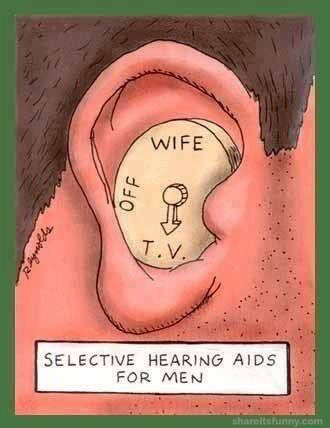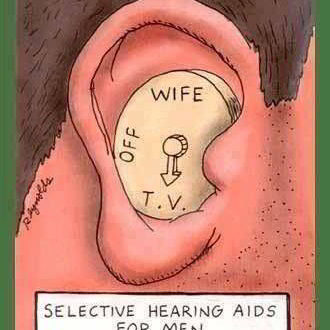From crowded work conferences to boisterous family dinner parties, throw a group of people into the same room and things can quickly get noisy. Yet somehow, most people can tune out what they don’t need to hear and focus on what they do. This is known as selective hearing, and essentially refers to the idea that the human brain can decide what it wants to hear and filter out what it doesn’t. And yes, it can get frustrating when you’ve asked your other half to wash the dishes multiple times and it’s just not sinking in.
So how does it work?
The “cocktail party effect”
 According to experts, not only does the brain decide which conversations it want to tune into, but it also empowers people with the ability to focus on certain conversations and exclude others that could both be competing for attention. This is known as the “cocktail party effect” and was first coined by British scientist Colin Cherry back in the 1950s. Over the past decade the concept has garnered more attention, with researchers at the University of California using a sophisticated decoding algorithm to prove that the brain is able to pick and choose what it hears. Even more amazing is the fact that they were able to pinpoint the specific words the brain was picking up on, which suggests that it has the power to prioritise auditory cues. If you’ve ever wondered why some people perk up when they hear the words “rugby score” and glaze over when they hear a “please fold the laundry” request this could be it.
According to experts, not only does the brain decide which conversations it want to tune into, but it also empowers people with the ability to focus on certain conversations and exclude others that could both be competing for attention. This is known as the “cocktail party effect” and was first coined by British scientist Colin Cherry back in the 1950s. Over the past decade the concept has garnered more attention, with researchers at the University of California using a sophisticated decoding algorithm to prove that the brain is able to pick and choose what it hears. Even more amazing is the fact that they were able to pinpoint the specific words the brain was picking up on, which suggests that it has the power to prioritise auditory cues. If you’ve ever wondered why some people perk up when they hear the words “rugby score” and glaze over when they hear a “please fold the laundry” request this could be it.
It’s all down to your personal goals
One explanation for words “floating in one ear and out the other” is the idea that what the brain chooses to listen to is influenced by background sounds and stimuli, as well as personalised behavioural goals. In other words, it all depends on how important a conversation is to you relative to other conversations or sounds that could be occurring simultaneously. So, if your personal goal is to watch the end of an All Blacks game, a competing goal like being asked to fold the laundry isn’t going to garner much attention.
The brain’s attention budget
So, when it comes to answering the question of whether selective hearing exists, the answer is a definite yes. Advancements in technology and cognitive research prove that attention is an expensive resource, which means that the brain is forced to pick and choose what it listens to. So can you really blame your other half for claiming not to have heard you ask them to complete a mundane chore? Not really! Of course, there’s also the flip side. While a rugby score may seem more important, responding to requests from a partner is also an important part of cultivating a relationship based on respect and value. When the brain chooses to prioritise the latter, even the most tedious of tasks should garner some attention.
Do you believe in selective hearing? Maybe you choose to listen “selectively” sometimes or have an “in one ear and out the other” partner. We’d love to hear about your experiences so please share in the comments below!









Join the Discussion
Type out your comment here:
You must be logged in to post a comment.